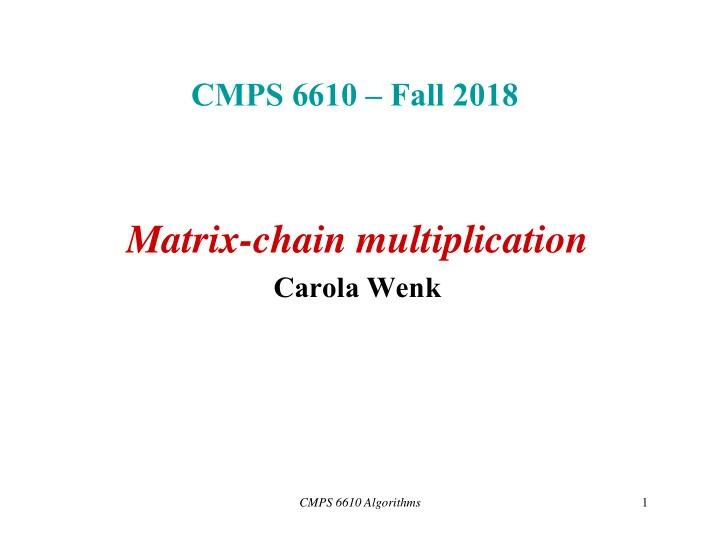

CMPS 6610 – Fall 2018 Matrix-chain multiplication Carola Wenk 1 CMPS 6610 Algorithms
Matrix-chain multiplication Given: A sequence/chain of n matrices A 1 , A 2 ,…, A n , where A i is a p i-1 p i matrix Task: Compute their product A 1 ꞏA 2 ꞏ…ꞏA n using the minimum number of scalar multiplications. 2 CMPS 6610 Algorithms
Matrix-chain multiplication example Example: n =3, p 0 =3, p 1 =20, p 2 =5, p 3 =8. A 1 is a 3 20 matrix, A 2 is a 20 5 matrix, A 3 is a 5 2 matrix. Compute A 1 ꞏA 2 ꞏA 3 . A 2 20 A 3 ꞏ 5 ꞏ A 1 p 0 =3 p 3 =8 p 1 =20 p 2 =5 3 CMPS 6610 Algorithms
Matrix-chain multiplication example (continued) A 2 20 A 3 ꞏ 5 ꞏ A 1 p 0 =3 p 3 =8 p 1 =20 p 2 =5 • Computing A 1 ꞏA 2 takes 3ꞏ20ꞏ5 multiplications and results in a 3 5 matrix. • Computing A i ꞏA i+1 takes p i-1 ꞏp i ꞏp i+1 multiplications and results in a p i-1 p i+1 matrix. 4 CMPS 6610 Algorithms
Matrix-chain multiplication example (continued) A 2 20 A 3 ꞏ 5 ꞏ A 1 p 0 =3 p 3 =8 p 1 =20 p 2 =5 • Computing (A 1 ꞏA 2 ) ꞏA 3 takes 3ꞏ20ꞏ5+3ꞏ5ꞏ8 = 300+120 = 420 multiplications • Computing A 1 ꞏ(A 2 ꞏA 3 ) takes 20ꞏ5ꞏ8+3ꞏ20ꞏ8 = 800+480 = 1,280 multiplications 5 CMPS 6610 Algorithms
Matrix-chain multiplication Given: A sequence/chain of n matrices A 1 , A 2 ,…, A n , where A i is a p i-1 p i matrix Task: Compute their product A 1 ꞏA 2 ꞏ…ꞏA n using the minimum number of scalar multiplications. Find a parenthesization that minimizes the number of multiplications 6 CMPS 6610 Algorithms
Would greedy work? • Parenthesizing like this ( … ((A 1 ꞏA 2 )ꞏA 3 )…ꞏA n ) does not work (e.g., reverse our running example). Try dynamic programming 7 CMPS 6610 Algorithms
1) Optimal substructure for i j Let A i,j = A i ꞏ…ꞏA j • Consider an optimal parenthesization for A i,j . Assume it splits it at k , so A i,j = (A i ꞏ…ꞏA k )ꞏ(A k +1 …ꞏA j ) • Then, the par. of the prefix A i ꞏ…ꞏA k within the optimal par. of A i,j must be an optimal par. of A i,k . (Assume it is not optimal, then there exists a better par. for A i,k . Cut and paste this par. into the par. for A i,j . This yields a better par. for A i,j . Contradiction.) 8 CMPS 6610 Algorithms
2) Recursive solution a) First compute the minimum number of multiplications b) Then compute the actual parenthesization We will concentrate on solving a) now. 9 CMPS 6610 Algorithms
2) Recursive solution (cont.) m [ i , j ] = minimum number of scalar multiplications to compute A ij Goal: Compute m [1, n ] A i,j = (A i ꞏ…ꞏA k )ꞏ(A k +1 …ꞏA j ) p k p j p i-1 p k Recurrence: • m [ i , i ] = 0 for i =1,2,…, n min ( m [ i , k ]+ m [ k +1, j ] + p i-1 p k p j ) • m [ i , j ] = i k < j 10 CMPS 6610 Algorithms
Recursion tree 1,4 1,1 1,2 3,4 2,4 1,3 4,4 2,2 3,4 . . . 2,3 1,1 2,2 4,4 • The runtime of the straight-forward recursive algorithm is (2 n ) • But only (n 2 ) different subproblems ! 11 CMPS 6610 Algorithms
Dynamic programming M ATRIX _C HAIN _DP( p , n ): for i :=1 to n do m [ i , i ]=0 for l :=2 to n do // l is length of chain for i :=1 to n - l +1 do j := i + l -1 m [ i , j ]= for k := i to j -1 do q := m [ i , k ]+ m [ k +1,j]+ p i -1 * p k *p j if q < m [ i , j ] then m [ i , j ]= q s [ i , j ]:= k //index that optimizes m[i,j] return m and s ; 12 CMPS 6610 Algorithms
Dynamic programming • Use dynamic programming to fill the 2- dimensional m [ i , j ]-table • Bottom-up: Diagonal by diagonal • For the construction of the optimal parenthesization, use an additional array s [ i , j ] that records that value of k for which the minimum is attained and stored in m [ i , j ] • O( n 3 ) runtime ( n n table, O( n ) min- computation per entry), O( n 2 ) space • m [1, n ] is the desired value 13 CMPS 6610 Algorithms
Construction of an optimal parenthesization P RINT _P ARENS ( s , i , j ) // initial call: print_parens(s,1,n) if i=j then print “A”i else print “(“ P RINT _P ARENS ( s , i , s [ i , j ]) print “) ꞏ( ” P RINT _P ARENS ( s , s [ i , j ]+1, j ) print “)” Runtime: Recursion tree = binary tree with n leaves. Spend O(1) per node. O( n ) total runtime. 14 CMPS 6610 Algorithms
Recommend
More recommend